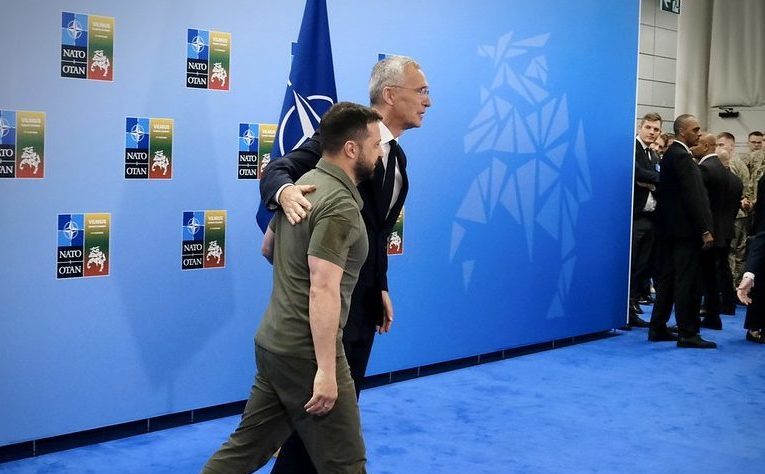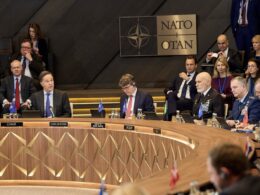Although the dust hasn't settled yet, the number of assessments of the Vilnius NATO Summit outcomes may only compete with the number of predictions and forecasts issued in the run-up to the event. At the same time, the tone and wording of evaluations may cater to all tastes, from pessimists to informed realists.
From the Ukrainian standpoint, this NATO Summit presents a milestone, both in clarifying the way to the membership and confirming NATO’s vital support. However, the real battle is yet to come in Washington.
Watered-down invitation
Since submitting its application for NATO membership last fall, Ukraine has embarked on an intensified diplomatic and political track on solidifying joint allies’ position vis-à-vis potential accession. The most optimistic expectation from the fighting country was to archive confirmation from the Alliance side that Kyiv is invited to join NATO once the war is over.To archive this goal, the Ukrainian side employed heavy-weighers, like the president of Ukraine, members of government and parliament, as core advocates. At the same time, till the very last day before the Summit, it was clear, that there was a strong camp of any meaningful pledge for Ukrainian membership aspirations.
Ultimately, the primary diplomatic battle took place while searching for the right wording of whether and when allies may consider opening the accession process for Ukraine. After heated discussions and political blackmailing from Ukrainian politicians threatening not to show up at the summit, the final Communiqué offered the following algorithm: NATO “will be in a position to extend an invitation to Ukraine to join the Alliance when Allies agree and conditions are met.”
Such a formula disappointed many, as it doesn't offer any concrete timeframe or specify any road map for membership, as boldly expected in Kyiv. In fact, it is not even clear what the exact conditions mentioned in the statement are.
Reforms track without Membership Action Plan
Yet another negotiation line between NATO allies and Ukraine was the future framework for approximation and accession to NATO. It was argued that the current Annual National Program (ANP), which outlines the cooperation between the Alliance and Ukraine, is rather obsolete and lacks political ambitions on the way to membership. Along with Membership Action Plan (MAP), the ANP no longer reflects the realities on the ground in relations between the two sides and needs to be transformed into a meaningful but concise roadmap to outline a set of reforms to be implemented by official Kyiv.
At the end of the day, both sides admit progress in this domain. Although not as expected in Ukrainian offices. Allies have sold Ukraine the exemption of the MAP from the Ukrainian path to NATO as a serious achievement. But what makes Kyiv’s expectations unmet is the preservation of the ANP (although somehow modified), which doesn’t square the concept of small but practical reforms roadmap.
Comprehensive Assistance Package 2.0
Kyiv is also interested in keeping intact the assistance from NATO during wartime. After the Madrid Summit 2022, NATO has already modified its support under the Comprehensive Assistance Package (CAP), streamlining funds for non-lethal military support to Ukraine. During previous yes, partners have committed over 500 million Euros to the CAP.
Vilnius CAP is a further step forward, extending financial resources available for Ukraine over a longer period. Although the budget for CAP is not specified in the final Communiqué, it transitions to a multi-year program with sustained and predictable funding. CAP 2.0 can significantly contribute to bridging the gaps in other vital areas, like logistics, energy security, and hybrid threats. In the long run, this instrument should help to transition Ukraine towards full interoperability with NATO.
A separate basket of this assistance will be devoted to reform implementation. Such an approach brings additional motivation and a toolkit for Ukrainian authorities to progress on reforms needed to align Ukraine with NATO standards. The lack of progress on these reforms was mentioned as one of the reasons for the restrained response to Ukraine’s aspirations from the NATO side.
From Commission to Council: Institutional upgrade
The second day of the Vilnius NATO Summit also featured the inaugural meeting of the NATO-Ukraine Council, a new institutional framework substituting the NATO-Ukraine Commission. This format is believed to provide equal political ground for a high-level bilateral track between NATO and Ukraine and create a platform for urgent consultations on issues of relevance.
The Council might really become a good forum for keeping dialogue about Ukraine’s reforms on track, although it is highly doubtful that the Council’s role as a mechanism for urgent consultations may bring tangible benefits. Let’s not forget that Ukraine has previously tried to operationalize the NATO-Ukraine Commission for the same purposes, but the results were not as robust as expected. Additionally, the question remains about Hungary's further potential misuse of its veto power for Council meetings, as was the case with high-level meetings under the Commission.
Assurances to continue working on guarantees
As often happens during important international assemblies, the main outcomes stem from the margins. In this way, from the Ukrainian point of view, the statement of G7 might be considered the most valuable and promising. The leaders of great powers delivered statements that announced the immediate opening of the negotiations to draw the specific, bilateral, long-term security commitments and arrangements.
This statement is symbolic in many respects.
Firstly, it has eventually given momentum to the Kyiv Security Compact, the concept designed by the international working group under the leadership of the Head of Ukraine’s President Office Andriy Yremak and former NATO Secretary General Anders Fogh Rasmussen.
Second, although short of Article 5 of the North Atlantic Treaty, new arrangements might evolve into bilateral and collective security assistance deliveries to Ukraine and contribute to Ukraine’s ability to defend its sovereignty and regain territories.
As an interim security formula, it presents added value compared to the current international commitments and mechanisms.
What’s next?
The Vilnius NATO Summit has showcased that despite creative diplomatic and political campaigns, allies still remain split over Ukraine's destiny. Ukrainian actors have studied and know well their opponents' main narratives. Although most of them rest on prejudices, manipulation, and stereotypes, it still affects national constituencies in Ally states and requires attention from Kyiv.
Fear of Russian nuclear escalation still remains the most divisive factor which influences the agenda of NATO and the lukewarm resolve of allies. That’s why, along with targeted advocacy campaigns for societies of Western partners, Ukrainian success on the battlefield could prove the weakness of the Russian “second-largest army” and the overblown of the Kremlin.
The Summit in Lithuania for Ukrainians should be seen as a transition phase to get ourselves more prepared for the next Summit in Washington in 2023. Although vaguely mentioned in the Communiqué, Ukraine received some prompts for reforms implementation. They have to be addressed immediately where possible in times of war with Russia. In partnership with like-minded NATO allies, Ukraine has to double down on consultations and awareness-raising campaigns with problematic member-states.
In technical terms, Ukraine should eliminate any excuses for opponents to finger-point at its underperformance in political, economic, and military readiness to join the Alliance. Until now, Ukraine’s poor performance has been one of the main narratives for those saying no to Ukraine’s rapprochement approach to NATO.
To see a green light at the Washington Summit, which will be one of the most influential NATO assemblies, Ukrainian leadership and civil society have to start preparations the next day after the Vilnius Summit is over.

Hennadiy Maksak is the Executive Director of the Foreign Policy Council “Ukrainian Prism," a Ukrainian NGO dealing with foreign relations. He is also Head of the Civic Council under Ukraine's Parliamentary Committee on Foreign Affairs.
Related:
Bucharest+, Budapest+: seven things Ukraine brings home from the NATO summit in Vilnius





